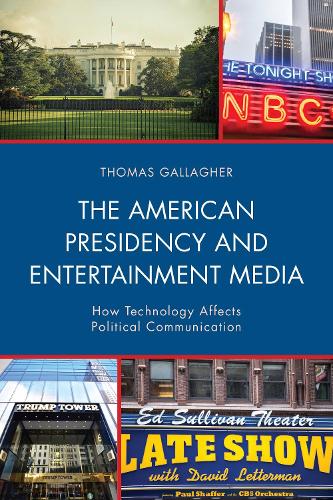
The American Presidency and Entertainment Media: How Technology Affects Political Communication
(Paperback)
Available Formats
Publishing Details
The American Presidency and Entertainment Media: How Technology Affects Political Communication
By (Author) Thomas Gallagher
Bloomsbury Publishing PLC
Lexington Books
13th June 2019
United States
Classifications
Professional and Scholarly
Non Fiction
320.973014
Physical Properties
Paperback
174
Width 153mm, Height 220mm, Spine 13mm
272g
Description
The need for American presidential candidates and sitting presidents to connect with citizens has led to the adoption of diverse media strategies that include traditional news initiatives with established journalists, face-to-face interaction with small groups of supporters, and visits to traditionally non-political entertainment-based venues. The American Presidency and Entertainment Media: How Technology Affects Political Communication examines the recent embrace of entertainment forums for political purposes. Featuring interviews with White House insiders and late night talk show veterans, this book analyzes the major moments in the presidencys increasingly cozy relationship with entertainment-based television shows and the major factors leading individual administrations and campaigns to take chances to reach largely non-political audience. It offers a new theoretical underpinning for this phenomenon, predicts how future campaigns will operate in this regard as media technology and American political culture evolve, and connects the marriage of politics and televised entertainment to the ascension of Donald Trump to the presidency.
Reviews
Long before Donald Trump, candidates and sitting presidents used entertainment media to reach both politically engaged and disengaged audiences. However, Gallagher (Mercy College) suggests that Americans are now witnessing the ultimate fusion of politics and entertainment. He offers insight into the new political communication landscape using interviews with two-dozen campaign operatives and administration staff. As he traces the uneven path to the entertainment-based environment, one cannot help but recall Lyn Ragsdales explanation of the single-executive image in her book Presidential Politics (CH, Mar'89, 26-4136). This time, not all blame rests with network news, which finds it easier to cover one person than 535 and the bureaucracy. Although other presidential hopefuls pioneered the use of digital media, Trump made it a centerpiece of his candidacy. Trump became a household name through entertainment media and used social media to create distrust in mainstream media and political insiders. Regardless, Gallagher still views entertainment media as a platform for presidential candidates and sitting presidents. A challenge is how to use it to ones advantage. A more serious challenge is how to maintain the dignity of the office. At base, the real concern may be how use of entertainment media impacts political parties and meaningful deliberation. Summing Up: Recommended. Upper-division undergraduates through professionals. * CHOICE *
In all, this book offers a good accounting of descriptive events related to entertainment media in recent presidencies and presidential campaigns. Interpreted through interviews by political insiders, the book leads the reader to the clear conclusion that entertainment media is central to contemporary presidential politics. If we are to know whether entertainment media help presidents or presidential candidates achieve their goals, future researchers will need to build upon this descriptive and engaging work. * Congress & the Presidency *
This is a great look at the connections between Washington and Hollywood-- and how each influences and shapes the other. It's original, thoughtful and fun to read. -- Robert M. Shrum, University of Southern California, Dornsife
Over the past thirty years, the shifting media landscape has presented challenges and opportunities for political candidates to connect to national audiences with entertainment forums. Gallagher vividly chronicles how presidents slowly, and controversially, have used Americans hunger for entertainment to propel their candidacies and promote their causes, transforming public perceptions of the presidency in the process. This book astutely examines how the two institutions that now dominate American political culturethe presidency and the entertainment industryhave used one another for ratings and relevance. -- Kathryn Cramer Brownell, Purdue University
Over the past thirty years, the shifting media landscape has presented challenges and opportunities for political candidates to connect to national audiences with entertainment forums. Gallagher vividly chronicles how presidents slowly, and controversially, have used Americans hunger for entertainment to propel their candidacies and promote their causes, transforming public perceptions of the presidency in the process. This book astutely examines how the two institutions that now dominate American political culturethe presidency and the entertainment industryhave used one another for ratings and relevance. -- Kathryn Cramer Brownell, Purdue University
Author Bio
Thomas Gallagher is adjunct professor at Mercy College.
